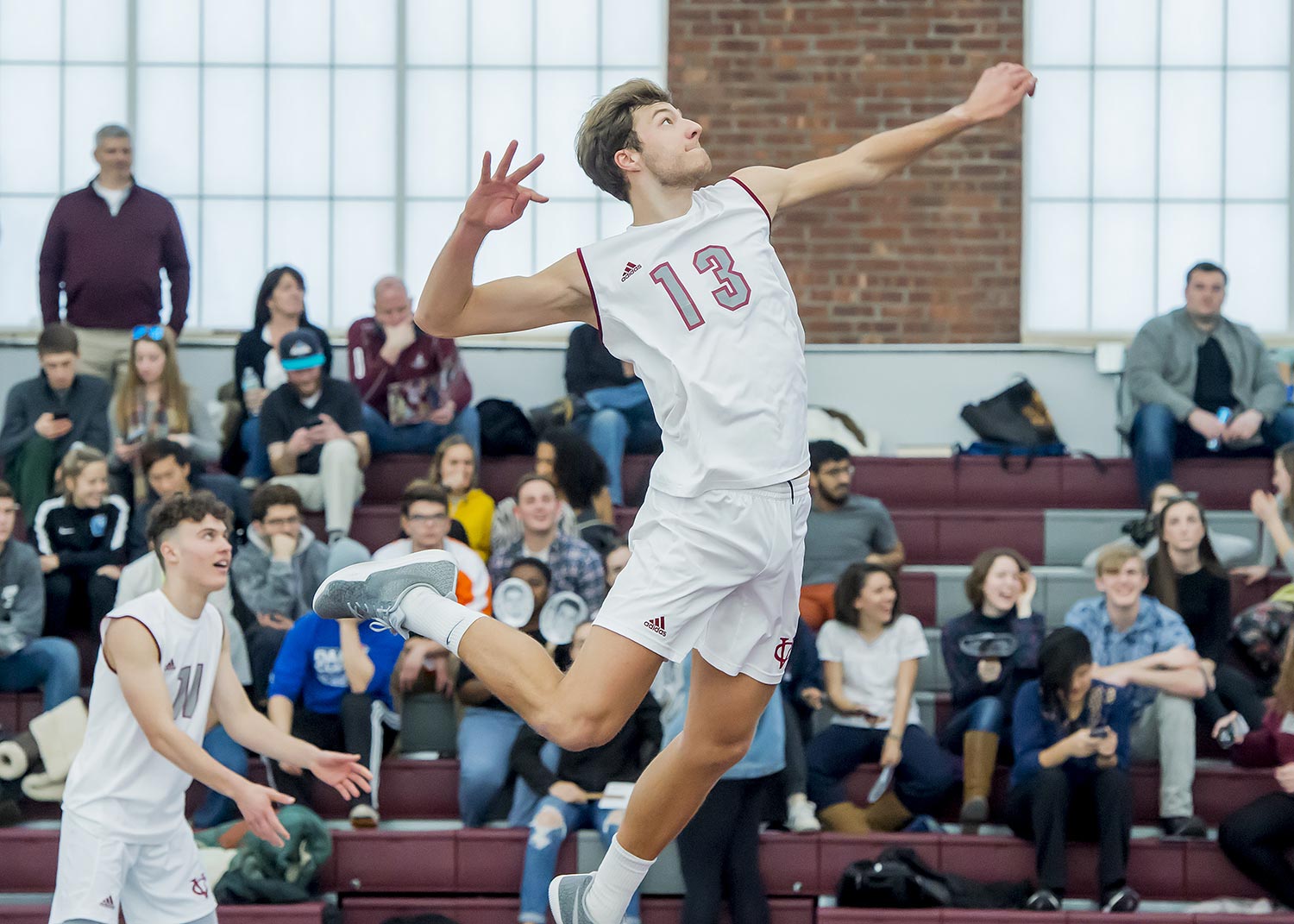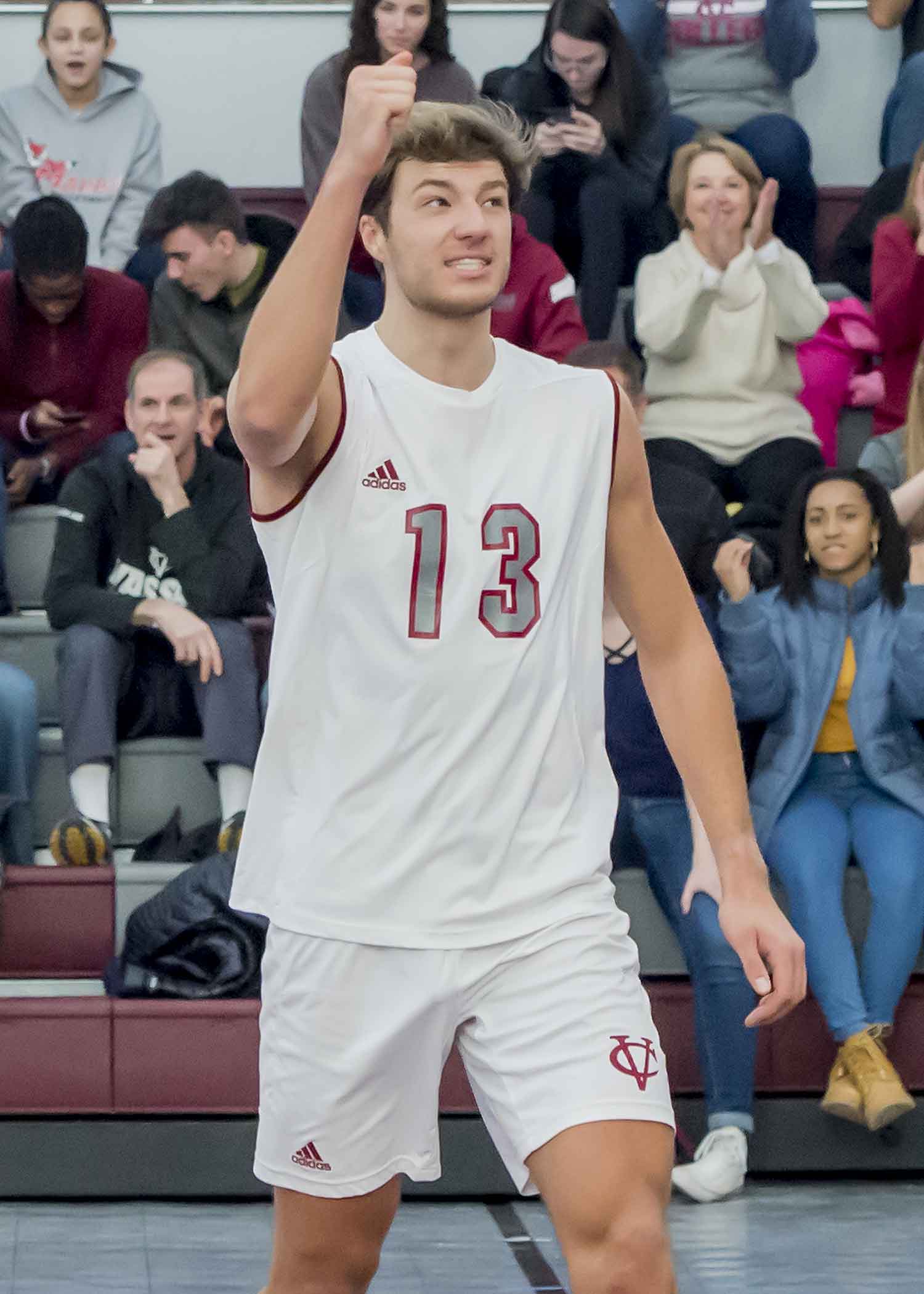Representing the Liberty League at the NCAAFive Questions for Matthew Knigge ’18
Representing the Liberty League at the NCAAFive Questions for Matthew Knigge ’18
Vassar men’s volleyball player Matthew Knigge ’18 is one of the most decorated student athletes in the college’s history. He has been named to the American Volleyball Coaches Association’s All-American team in each of the past two seasons, and he was named to the All-Academic Team last year by the College Sports Information Directors Association. Knigge, an International Studies major from New Egypt, NJ, also won Vassar’s Betty Richey Outstanding Performer of the Year Award in 2016 and 2017 and was one of six members of the volleyball team to earn United Volleyball Conference All-Academic honors.

In addition to his achievements on the court and in the classroom, Knigge has been working for his fellow student athletes as a member of Vassar’s Student-Athlete Advisory Committee (SAAC). He is currently Vassar’s SAAC president, and this year he was named chair of the NCAA Division III Student-Athlete Advisory Committee. He is one of 24 varsity athletes in the country serving on the national SAAC Committee. Recently, Knigge talked about his athletic and academic experience at Vassar and his work with the NCAA.
Q. Competing in a varsity sport and excelling in academics at an elite school like Vassar is enormously time-consuming. Why did you decide to take on added responsibilities as a member, and now president, of SAAC?
A. My role as SAAC president affords me the opportunity to speak for all student-athletes here, not just about their athletic experience but also about their academic experience and their general health and welfare. Our goal is to ensure and enhance the quality of life for all student-athletes.
Q. What role do you play in addressing these issues on a national level as a member of the NCAA Division III SAAC?

A. There are 46 individual leagues and conferences in the NCAA, and I represent the Liberty League and the New Jersey Athletic Conference in meetings at NCAA headquarters in Indianapolis. We meet about six or seven times a year in Indianapolis, and correspond on a weekly basis by email. A lot of our time is spent on Division III’s ongoing partnership with Special Olympics, now in its 50th year. The other issue we discuss most often is the mental health of the student-athlete, to make sure all student-athletes know what resources are available to them. There’s a culture in athletics sometimes telling athletes to “suck it up” and not complain, but our mantra is “It’s OK to not be OK” and to ask for help. It’s been gratifying to take part in advocating for these programs, not just for the 500 student-athletes at Vassar but also for the 186,000 Division III athletes across the country.
Q. Tell us about your expectations as a student-athlete when you first enrolled at Vassar four years ago.
A. Well, for one thing, after what can only be described as a mediocre season my freshman year, I never dreamed we’d become one of the elite teams in the country [Vassar was ranked fourth in the nation at the end of the 2017 season]. And I certainly never expected to become an All-American. The only way I can describe it is that it’s funny that all these opportunities came my way.
Q. When you were deciding where to go to college, you had some opportunities to attend Division I schools that may have had more resources for athletes; yet you chose Vassar. Looking back, are you glad you made that choice?
A. Absolutely. The Division III approach is much more academic-oriented, and now that I’m about to graduate from Vassar, I have so many more career options going forward. If I’d chosen a Division I school I wouldn’t have had the opportunity to study abroad [he spent the first semester of his junior year in Russia] and probably would not have had the chance to do volunteer work overseas. The summer after my freshman year I taught English in a town in Moldova, where I helped create a summer English language program.
Q. What are your post-Vassar plans?
A. I majored in international studies with a concentration in energy policy, but I’m also interested in possibly pursuing a career in athletics management. I may have an opportunity to play volleyball professionally in Europe, and that would allow me to put off my decision on which avenue to pursue. But whatever I decide, Vassar has prepared me well.